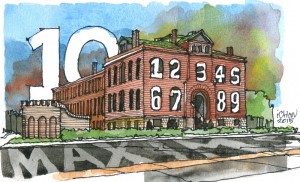by Ivan Chow, AIA
Having been blessed with a rewarding, albeit circuitous, career spanning well over 30 years, from the sole proprietorship of a small design firm to being the managing director of a $400 million commercial real estate portfolio, I have developed 10 project management principles, or maxims, that have served me well. These have been tried and tested in the management of design projects, for-profit and nonprofit organizations, small firms and large corporations, and recently, in higher education. They have been, more often than not, useful and successful in working with clients, consultants, supervisors, subordinates, coworkers, municipalities, accountants and attorneys. These maxims have hung long enough on my walls and in the cubicles of coworkers to have given me enough confidence to think they are, at the very least, useful.
Maxim 1 – Good communication is the key to success in business and life. This does not mean stream-of-consciousness email messages and calls but understanding the work styles and temperaments of those with whom you are communicating.
Maxim 2 – If it’s not in writing, it does not exist. This does not mean that what is not in writing is unimportant, but that handshake agreements are generally not admissible in courts of law and are fraught with risk.
Maxim 3 – Less is more. On any given topic, it is likely harder to write a two-page executive summary than a 10-page exposition.
Maxim 4 – Document all sources and assumptions. I can’t tell you how many times this has come back to bite me when I have neglected to save URLs, bibliographic sources or code compliance sections or to record my own rationale.
Maxim 5 – Maintain consistency throughout each task or project. This requires the most discipline and more often than not mandates uncomfortable changes in presuppositions.
Maxim 6 – Do the best possible work with the time and resources available. There is never enough time to do everything you hope for or intend. Perfection is in achieving the best possible result with what you have.
Maxim 7 – Bring closure to every task and project regardless of outcome. This is very difficult, especially in the case of failure, but if we are to learn from our mistakes, they must be clearly understood.
Maxim 8 – Mistakes are a necessary evil in the pursuit of excellence. We live in a culture that heralds success and belittles failure without recognizing that the latter begets the former.
Maxim 9 – Seek clarity; do not dwell in uncertainty. This does not mean that uncertainty is inappropriate or unnecessary but that the quest for certainty can be infectious and inspiring.
Maxim 10 – Check your work again … and again. Check your spelling and grammar, your presuppositions and assumptions, your motives and the optics through which your work will be viewed. And then get someone else to check all the above.
I do not always adhere to these maxims myself, especially in times of high stress and anxiety and time-compressed expectations. My own family would likely be surprised at my claim to these practices. However, they have served as a good reminder of what I consider “baseline operations” when I am at an intuitive loss as to how to proceed, especially at work.
In conclusion, it needs to be said that, through trial and (a lot of) error, and alongside these 10 maxims, I have learned that managing projects is actually more about managing people and time than it is about managing processes or procedures. I have also learned that there is an important distinction between management and manipulation. The necessity of the former should not be confused with the ugliness of the latter.
Ivan S. Chow, AIA, NCARB, is the interim chair of the architecture and urban design departments at SCAD.

